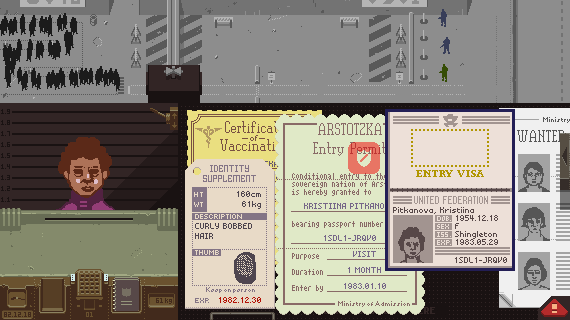Relatively recently I played a game called Papers Please. The idea of the game is you play as an immigration inspector for the fictional country of Arstotzka. The border is heavily guarded and entry into the country follows very specific rules due to post-war tensions. The player must inspect the documents that would-be immigrants present at the gate and verify that the information is correct and that the documents provided are sufficient to allow access into the country. The rules for which immigrants are permitted entry change due to changes in the political situation of the game’s storyline. Overall, as the game progresses and tensions rise, more and more paperwork is necessary to allow an immigrant into the country. Over the course of the game, a rebel group approaches the player asking for help. The player is also faced with a variety of other moral dilemmas including whether to let in individuals who have insufficient papers but some sort of dramatic personal backstory. The player themselves is underpaid and gets disciplined for mistakes, working to support a family with very little wage. The game has 20 different endings depending on how you choose to perform your duties.
One of the qualities that made this game such an interesting experience for me was that I found a strange sense of fun in the monotony of checking the immigration papers. While some might find this kind of gameplay tedious, I found it strangely calm and relaxing. Repetition and tedium is often seen as being something that should be avoided in games to prevent the player from getting bored or feeling unrewarded (i.e. repetitive grinding to get to level up a character without advancing the plot, etc.) However, repetition really worked to tell the story and set the tone of Papers Please. I guess because I’m a person who likes to organize things, something about the gameplay of repetitively checking and verifying these immigration papers was really fun to me. However, this sense of fun I got from the game directly conflicted with my tendency to want to resist the system. I thought it was interesting that I was enjoying the repetitive game mechanic (and therefore enjoying my job as an immigration inspector) so much, and yet the story I wanted for my playthrough was to align myself with the rebels and overthrow the government. By playing the game I was placed in an uneasy state in which I had to reconcile my enjoyment of the game’s mechanics with my dissatisfaction with the fictional Arstotzkan government, because I was having fun doing something that that government was forcing me to do.
